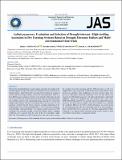| dc.description.abstract | Breeding for drought tolerance in crops requires responding knowledge on the moisture regimes of crops. This study was conducted to evaluate and select the drought tolerant - high yield Lablab accessions in the dry farming systems of Tanzania based on drought tolerance indices and field performance. Three sites from different agro-ecological conditions were selected for the study and each site involved trials with moisture stress-free (MSF) and early terminal moisture stress (TMS) conditions. The experimental design consisted of a randomized complete block design. The twelve accessions used in the study were the best genotypes selected from the former moisture screening experiment at the seedling stage. Data collections included days to 50% flowering and maturity, seed yield plant-1 and seed yield ha-1. The responses of the accessions to TMS conditions were quantified through ten developed indices whose correlation coefficients were computed from the mean of the seed yield plant-1 under MSF and TMS conditions. ANOVA and post-hoc tests were used to analyze the variation among the accessions and their field parameters as well as to compare their means, respectively. Based on this analysis, three indices; mean productivity, geometric mean productivity, and stress tolerance index were discovered with higher correlation coefficients (>0.5), and thus effective for selecting the TMS tolerant accessions with high seed yield plant-1 under both conditions. Through the combined rank mean method, D147, D363, HA4, D349, D352, D348, and D359 were generally selected as Lablab TMS tolerant accessions with high seed yield plant-1 across the evaluation sites. Although the significant difference (p<0.05) in field performance was noted among the accessions and across the sites, promising trends were found among the above selected TMS tolerant accessions. It is therefore suggested that, further evaluation of the above-selected accessions should involve farmers in their fields before releasing them as commercial varieties. | en_US |

